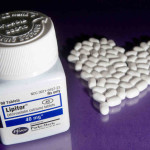 Now that cholesterol reducing Lipitor has lost its’ patent, what is in store for the future of this blockbuster cash cow of a drug? Quite frankly….nothing. Its’ reign is officially over and its’ owner Pfizer Inc. is quietly giving up on it for good because more generic versions will soon be going on sale.
Now that cholesterol reducing Lipitor has lost its’ patent, what is in store for the future of this blockbuster cash cow of a drug? Quite frankly….nothing. Its’ reign is officially over and its’ owner Pfizer Inc. is quietly giving up on it for good because more generic versions will soon be going on sale.
But, they didn’t give up without a fight! The world’s biggest drug maker actually conducted an intriguing experiment in brand marketing this year, aggressively pushing the cholesterol-fighting drug Lipitor in the U.S. even after its patent expired on Nov. 30.
Normally, when a drug goes generic, drug companies generally give up on it right away and move on to the next thing that can potentially create major profits for them. But Pfizer didn’t want to do that. Lipitor had brought in so much money, as much as $12.9 billion annually at Lipitor’s peak, the company was hoping that it could find a way that it could continue to be a revenue stream.
So, with a combination of discounts, coupons and payer contracts, the drugmaker aimed to protect market share as long as possible, with their goal of keeping 40% of the market. And although they were somewhat successful, they kept upwards of 30%, and actually managed to bring in $383 million in domestic sales for the first quarter, making it the company’s third best-selling drug in the U.S. after spending more than $87 million promoting the medicine; nonetheless it is time to throw in the towel.
But, why now? Simply put, it has now been 180 days. Brand-name drugs take their biggest hit after 180-day exclusivity expires and increased competition pushes prices downward. And that’s what Lipitor faces as of June 1. So it is no surprise that Pfizer chose to pull back now.
So, was it a successful marketing scheme? Some think so. They believe that Pfizer’s approach will probably inspire other companies facing generic rivals to their blockbuster products. “It’s helped them hang on to additional volume compared to other generic erosions,” Ben Weintraub, of Wolters Kluwer’s inThought, told The Wall Street Journal.
Ultimately only time will tell whether or not it was a sucessful scheme, apart from the money that Pfizer ending up making. As for if it truly inspires others to be creative and attempt something as well, we could soon find out as Sanofi and Bristol-Myers Squibb lose patent protection for their megablockbuster Plavix later this month.
